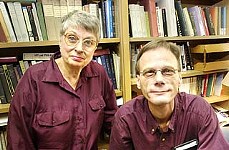Take Me, Instead
An interview with SWT's Arturo ManCha, whose novel in progess was a recent break-in casualty
By Michael Erard, Fri., April 25, 2003
Then, on April 10, a thief entered Mancha's East Riverside apartment and stole a cell phone, his DVD player, and the Compaq Presario 1250 laptop that contained nearly all his work on Auroboros to date, including notes, research, and hundreds of pages of drafts. They say manuscripts don't burn, but the bad guys sure can put a dent in them: Vanished also are 200 crucial pages of brainstorming that formed the backbone of his writing process.
Based on a Native American creation myth, Auroboros (named after the snake that eats its own tail) tells the story of an autistic boy named Salvador who constructs a new religion from the message he decodes in the number pi, and its mix of esoteric numerology and impious theology was told in myth-like prose. Over lunch last week, Mancha struggled to sum his novel up. "It's kind of hard to explain," he said.
Fiction writer Debra Monroe, his workshop instructor this semester, called Auroboros "sprawling and apocalyptic," a combination of Rudolfo Anaya and Edward Spencer. "His determination to get the story told has been dogged, tenacious," she said in an e-mail to the Chronicle.
Luckily, 120 pages exist in hard copy, which two classmates have offered to retype for him. "It's absolutely amazing how many people have offered me help," he says. He's been set up with a free computer, and his University of Texas officemates took up a collection. Debra Monroe also gave him a sweet deal: Don't worry about handing anything in for next class.
"Right now I feel lost and empty because I'm at ground zero with my writing," Mancha says, "But I can also say that I feel loved and cared for because of the people who held out their hands to offer me help. I feel lost, and at home at the same time, you know what I'm saying?"
Will the loss change anything about the way he writes? "It definitely makes me want to write perfectly the first time around," he says. But, says Dr. Tom Staley, the director of the Harry Ransom Humanities Research Center, he might rely more on paper. As tempting as is the myth of the single white hot passion draft, there's a group of writers who, though relatively young and computer savvy, print successive drafts and make corrections on paper because "their habit is still to get to the tactile element, where you can follow the tracery on paper. Or," Staley says in an aside, "Maybe they're trying to wait and sell it to the HRC.
"I feel so touched by [Mancha's] story," he adds. "Most writers now, though, they always have a backup disk."
But today Arturo Mancha has two goals: start writing again, and get his stuff back. Before he cancelled the service of his cell phone, he managed to get three phone numbers the thief called, then those addresses and one name. Until the police call him back, he has hit a wall. He won't play vigilante, even though he has driven by the apartments. "I don't want to go down there and fuck something up, because that might affect us getting our stuff back," he says. Still, he says, he fantasizes about revenge. "I wouldn't want to hurt them physically. That type of pain heals. I would want them to be tortured every time they hide in dark corners, or every time they look over their shoulder, or every time they see a shadow."
Another of his past workshop professors, Tom Grimes, has lightly suggested that, vengeance or not, Mancha might end up ahead. Most authors hype their books after they're published, Grimes told him. "Congrats on the publicity," Grimes joked in an e-mail. "You know now that all future articles about you will begin, 'He called the loss of his first novel five years in the writing devastating. But today Arturo Mancha ...'"![]()








